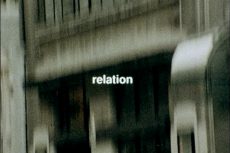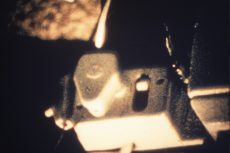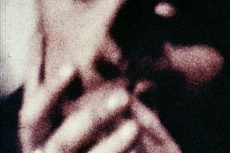“Struggles with Apprehension: Films by Peter Gidal.” May 14, 2016
- Assumption
- Room Film 1973
- Key
Struggles with Apprehension: Films by Peter Gidal
“I try to make films where each image, each object, is never given the hold of any recognition. Not to reproduce the given as given, to see each image, each object, each imaginary space-time narrative as imaginary projection, so that nothing takes on the status of truth. The lack of recognition … can force the construction of all representational motives as constructions, as artifice, as unnatural, as ideology, so that representation is always impossible.” — Peter Gidal
The Visible Press’ recent publication of a collection of Peter Gidal’s essays, Flare Out: Aesthetics 1966-2016 (available in the TIFF Shop), offers a welcome occasion to take another look at the British artist’s body of work. In contrast to the North American conception of Structural filmmaking practiced by Michael Snow, Hollis Frampton et al — where the reduction of cinema to formal techniques (zooms, constrained sets of images, etc.) could function as metaphors for consciousness — Gidal argued for a Marxist-inspired “Structural/Materialist” filmmaking, wherein those techniques will aid in our “unlearning” of the ideological assumptions behind such metaphors. Contending that cinematic illusionism bred passivity and capitulation to dominant forms, Gidal viewed Structuralist/Materialist film as a political strike not only against cinematic narrative, but against representation itself — a theory and practice that has attracted such acolytes as Cerith Wyn Evans (once a student of Gidal’s), Nicky Hamlyn and Emily Wardill. For Gidal, however, denial of representation is not the same thing as the denial of beauty, and his films can be richly rewarding in their evocations of the tactility of experience.
Made at the high point of the development of Gidal’s controversial ideas, Room Film 1973 belies the sweeping tone of its author’s polemics by literally being confined to a single room. Comprised of lumbering patterns of short shots, reprinted optically to enhance the grain and the colour, Room Film 1973 is experientially equivalent to groping around with a flashlight, trying to make sense of a liminal space where shadow and form intermix. The result is strangely beautiful, a profound questioning of the vision that we so often take for granted. (Michael Snow said of the film that “I felt as if my father made it, as if it were made by a blind man. I liked the tentativeness … one had to work at it, that searching tentative quality, that quality of trying to see.”)
Room Film 1973 is paired with two short pieces that take different tacks in their questioning of the cinematic image. Assumption — a tribute to the then recently deceased filmmaker Mary Pat Leece and the old London Film Makers’ Cooperative (of which Gidal was a founding member, and which celebrates its 50th anniversary this year) — is a condensed, one-minute film that depicts the operations of memory as a collision of images, text, and sounds. Key centres on a photograph of Nico (Gidal frequently wrote on Warhol’s work) which Gidal abstracts beyond recognition through a zoom, legibility never fully resolving beyond a dazzling canvas of pointillist colours.— Chris Kennedy
Assumption dir. Peter Gidal | UK 1997 | 1 min. | 16mm
Room Film 1973 dir. Peter Gidal | UK 1973 | 55 min. | 16mm
Key (dir. Peter Gidal | UK 1968 | 10 min. | 16mm
Saturday, May 14, 2016 1pm


